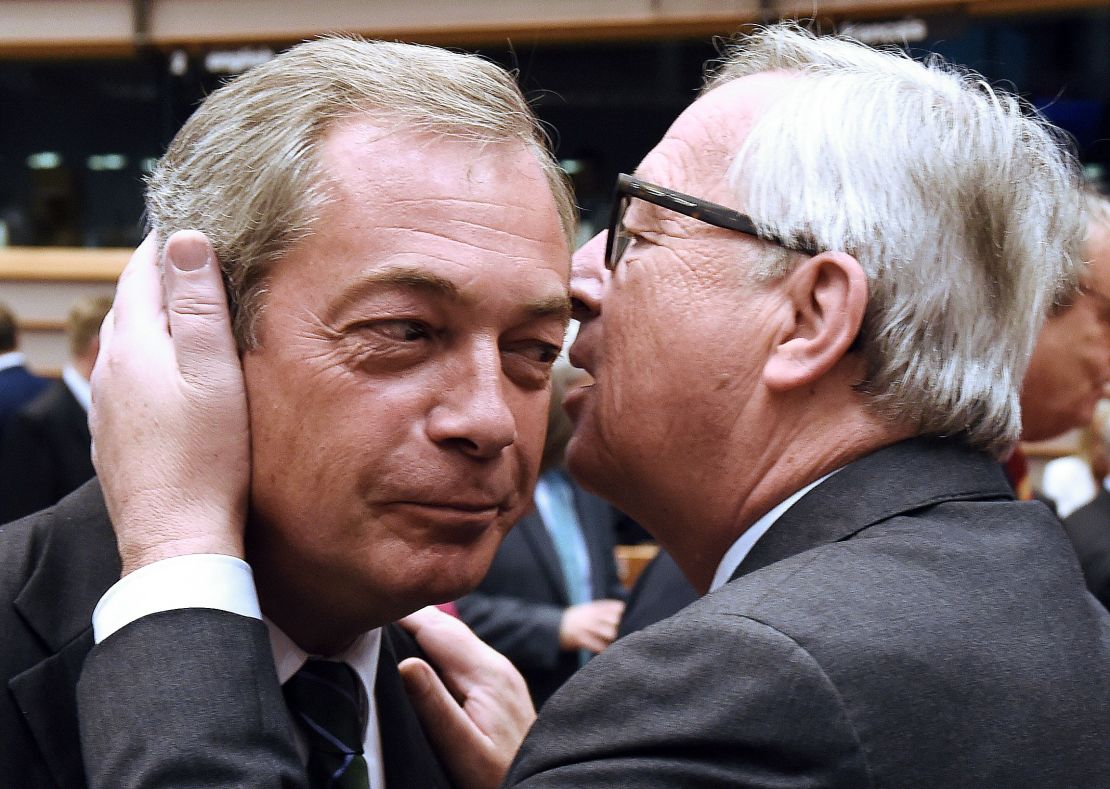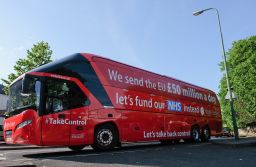Story highlights
NEW: UK opposition leader Jeremy Corbyn slapped with no-confidence vote
Scottish leader vows to keep all options on table in fight to remain in EU
The most vocal architect of Britain’s seismic decision to leave the European Union thumbed his nose at the EU Parliament Tuesday as members booed and turned their backs on him, in the most visible clash of ideologies between Britain and Europe since last week’s vote.
Nigel Farage, leader of the far-right UK Independence Party (UKIP), gloated unapologetically and antagonized a battered union in Brussels, calling for free trade with the bloc while insulting members in the same breath.
“Isn’t it funny? When I came here 17 years ago and I said that I wanted to lead a campaign to get Britain out of the European Union, you all laughed at me. Well, I have to say, you’re not laughing now, are you?” he said.

“I know that virtually none of you have ever done a proper job in your lives or worked in business or worked in trade or indeed ever created a job. But listen, just listen,” Farage said at the special meeting, held to address the Brexit fallout.
In an interview later with CNN, Farage brushed off his comments as a light-hearted joke, saying that the EU had called him “all the names under the sun.”
“They don’t like me. It’s mutual,” he said.
Britain’s divorce from the EU is shaping up to be messy, with Prime Minister David Cameron also in Brussels and at loggerheads with EU leaders over how to even begin.
Britain wants to hold off invoking Article 50 of the Lisbon Treaty – which will officially begin the separation process – until it knows what a future deal with the European Union will look like. The union wants the opposite, refusing to talk deals until the withdrawal is made official.
German Chancellor Angela Merkel said Britain’s separation from the EU was not a “cherry-picking exercise.”
“If you want to exist and leave this family, then you cannot expect all the obligations to drop away but privileges to continue to exist,” she said.
Italian Prime Minister Matteo Renzi told CNN’s Christiane Amanpour that the UK would not be able to belong to the European single market without accepting the free movement of people.
“In my view, it’s impossible to belong to (a) community only with the good things and not with the bad things,” he said.
“It’s impossible to be very communitarian about the economy and not about values. This is the problem, in my view, about this campaign.”
On CNN, Farage called for the article to be invoked “in the next few weeks.”
“I think we do need to send a message that we’re serious about this,” he said. “Let’s crack on.”
A Member of the European Parliament (MEP) since 1999, Farage appealed to MEPs to be “pragmatic, sensible, grown up” following the British public’s vote last week to leave.
Nigel Farage: Arch-euroskeptic and Brexit ‘puppet master’
“Let’s cut between us a sensible, tariff-free deal, and thereafter, recognize that the United Kingdom will be your friend – that we will trade with you, we will cooperate with you, we will be your best friends in the world,” he said.
Farage warned that the UK would “not be the last member state to leave the European Union.”
European Parliament President Martin Schulz cautioned Farage after the outspoken Euroskeptic insulted his fellow MEPs.
‘Shame on you’
The fiery exchanges took place as the EU Parliament convened for an extraordinary plenary session in Brussels Tuesday, with European and British delegates meeting to discuss the UK’s complicated and potentially messy divorce from the bloc.
At one point, a German MEP accused Farage and fellow Leave campaigners of misleading the British public over the vote.
“The worst liars can be found among UKIP,” said Manfred Weber, leader of the European People’s Party, to loud applause.
“Mr. Farage, if you had an ounce of decency in you, you would apologize today to the British. Shame on you.”
During his speech, Jean-Claude Juncker, the president of the European Commission, turned to confront Farage and said he was surprised he was there.
“That’s the last time you are applauding here,” he said to the British Brexiters.
“You were fighting for the exit, the British people voted in favor of the exit. Why are you here?”
Racist abuse reported in UK since vote to leave EU
No-confidence
Across the English Channel, Labour Party leader Jeremy Corbyn lost a confidence vote as a post-Brexit tornado tears through the world of British politics.
The secret ballot came after two-thirds of his shadow cabinet resigned in an apparent party coup. In Britain, the main opposition party appoints “shadow” cabinet ministers, mirroring those in government and taking on the same portfolios.
British media reported that his loss was overwhelming, with the vast majority voting against him.
The no-confidence vote is non-binding and means Corbyn is still party leader, but it paves the way for an official leadership challenge to be launched.
Corbyn said he would not stand down, despite the vote.
“I was democratically elected leader of our party for a new kind of politics by 60% of Labour members and supporters, and I will not betray them by resigning. Today’s vote by MPs has no constitutional legitimacy,” he said in a statement.
Corbyn brought tens of thousands of new members to the party from the hard left and enjoys overwhelming popularity, winning the leadership last year by a 40% margin.
The hard-left leader has been divisive among MPs in center-left Labour, who see his vision of a Britain with salary caps and nationalized transportation services as too radical.
If an official challenge is launched, Corbyn will need the support of just 20% of MPs and party members of the European parliament to run for his own job, and he could easily be re-elected as the vote goes to the entire party.
On Monday, Corbyn called for unity in the party, warning against “internal factional maneuvering.”
And the jockeying for power has already begun in Cameron’s Conservative Party – prominent leave campaigner Boris Johnson and Cameron ally Theresa May are seen as the front-runners, while Finance Minister George Osborne has ruled himself out of the running.
Brexit’s broken promises: Health care, immigration and the economy
Farage ‘too soft, too kind and too easy?’
Brits are jittery, not knowing who will lead their country come October or whether any of the promises made by the Leave camp will come to fruition.

Leave campaigners are already backpedaling on some of their pledges, and many who voted to leave say they feel cheated, and regret their vote.
The most common complaints relate to the leave campaigners’ claim that Britain gave £350 million a week to the EU and that the money saved from leaving would be poured into the stretched National Health Service.
Farage said he never made such a promise, and when asked by CNN why he didn’t then come out to correct the figure presented by his fellow campaigners, he said it was because he was “too kind.”
“I’m just too soft, too kind and too easy,” he said.
Farage rejected comparisons between himself and presumptive Republican presidential nominee Donald Trump, but he said he liked that “Trump dares to talk about things other people want to brush under the carpet.”
“I think Trump would be better for us than Barack Obama’s been. Of that there’s no doubt,” he said, adding that “there’s nothing on earth that could ever persuade me to vote for Hillary Clinton,” even though he doesn’t have the right to vote in the United States.
Why this British town backed Brexit
Leaders are now trying to allay fears that Britain may be heading for a recession and are trying to boost confidence in its markets and currency to avoid an economic meltdown.
The country just lost its top AAA credit rating with agency Standard & Poor’s, which measures a country’s ability to meet its financial commitments.
A record $3 trillion was wiped out from global markets on Friday and Monday in the wake of the shock Brexit vote.
A sizeable group of pro-EU demonstrators gathered in Westminster on Tuesday chanting, “We are European.” They held posters and waved flags of the EU. They also hoisted posters of Farage and Johnson, shouting “Shame on you.”
U.S. stocks: Uncertainty after Brexit
Sturgeon vows to fight to keep Scotland in EU
The vote last week to pull out of the union has wounded the European project and left Britain with a nasty hangover, sending the pound spiraling, dampening global markets, creating a leadership vacuum and triggering renewed talk of Scottish secession from Britain.
Speaking in the devolved Scottish Parliament in Edinburgh Tuesday, Scottish First Minister Nicola Sturgeon vowed to fight for Scotland to remain in the EU, in line with the wishes of the 62% of Scottish voters who took part in the referendum.
“Scotland has voted to remain in Europe, and we must now take all the action necessary to ensure that the will of the Scottish people is respected,” she said.
Sturgeon said she planned to meet with EU leaders in Brussels Wednesday for talks on how this could be accomplished, and was setting up a standing panel of experts on how to achieve Scotland’s EU objectives.
She said that while her priority was to protect Scottish interests and the relationship with the EU, “everything must be on the table to protect our place in Europe.” That included a second referendum on independence from the UK.
Since Scotland had voted by 55% to remain in the UK in a 2014 referendum, there had been “a very real and material change to Scotland’s circumstances,” she said.
“The country and the constitutional settlement the people voted for in 2014 is no longer a reality,” she said.
“If we were to be removed from the EU, it would be against the will of our people, that would be democratically unacceptable.”
Cameron in talks
British Prime Minister David Cameron began initial talks with EU leaders Tuesday, a meeting that will also be attended later by U.S. Secretary of State John Kerry.
Speaking to reporters on his arrival, Cameron said the UK would not “be turning our backs on Europe.”
“These countries are our neighbors, our friends, our allies, our partners… And I very much hope we’ll seek the closest possible relationship in terms of trade and cooperation and security, because that is good for us and that is good for them.”
Cameron said he would leave the decision to trigger Article 50 to his successor. He resigned after the vote and plans to step down in October.
He announced a new government unit on Monday to deal with the EU divorce – in his words, one of the “most complex” tasks assigned to the civil service in decades.
CNN’s Euan McKirdy, Richard Quest, Elizabeth Joseph, Christiane Amanpour, Mick Krever, Stephanie Halasz and journalist Simon Cullen contributed to this report.







